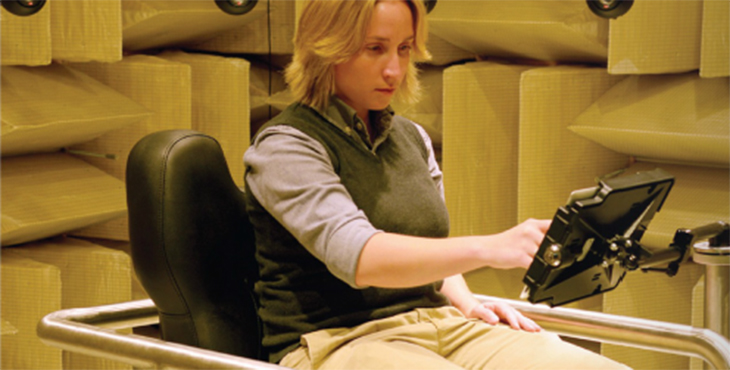In a recent article in Veterans Affairs & Military Medicine Outlook, writer Craig Collins describes a range of VA studies underway to prevent and treat hearing loss and other auditory problems.
Much of this work takes place at VA’s National Center for Rehabilitative Auditory Research (NCRAR). NCRAR conducts research into hearing and vestibular issues (balance and orientation problems). In addition to conducting their own research, NCRAR researchers train and mentor new scientists, disseminate information to clinicians who assess and treat Veterans, and provide educational resources to Veterans and community members
NCRAR’s mission is “to improve the quality of life of Veterans and others with hearing and balance problems through clinical research, technology development, and education that leads to better patient care.” Founded in 1997, NCRAR moved into a state-of-the-art facility at the VA Portland Health Care System in 2006. It is the largest audiology research center of its kind in the country.
Much of NCRAR’s research focuses on tinnitus, commonly called ringing in the ears. As Dr. Patrick Feeney, who leads NCRAR’s research program, explains, tinnitus affects Veterans more than civilians because of the greater likelihood that they have been exposed to loud noise. More than 1.1 million Veterans received compensation for tinnitus in 2013. The article also highlights several NCRAR projects on tinnitus, including the work of Dr. James Henry, who won the 2016 Paul B. Magnuson Award from VA’s Rehabilitation Research and Development Service. Henry developed an incremental treatment approach to tinnitus that is widely used in both VA and DOD hearing clinics.
Henry’s approach, Progressive Tinnitus Management (PTM), uses five levels of assessment and intervention based on the intensity of tinnitus. Treatment under PTM ranges from basic education in condition management for mildly irritating tinnitus to specialized one-on-one services for debilitating tinnitus.
In addition to this program and other tinnitus research, NCRAR also examines types and causes of hearing difficulties in Veterans, including age-related hearing loss, ototoxicity (hearing loss caused by medication), and sensory processing problems resulting from blast exposure. These and other projects are detailed further in Collins’ review.
Collins also discusses work at the Auditory Vestibular Research Enhancement Award Program (AVREAP). AVREAP, located at the Mountain Home (Tennessee) VAMC, aims to improve the quality of life for Veterans with hearing and balance disorders. The program comprises five research laboratories and six core investigators with expertise in hearing assessment and rehabilitation, vestibular assessment and rehabilitation, and physical therapy. Led by director Dr. Faith Akin, AVREAP investigators have spent many years studying what happens to the vestibular system when exposed to loud noises. Much of the research done at AVREAP deals with balance problems caused by damage to inner-ear organs, as well as strategies to better serve Veterans who may benefit from hearing aids.
Through these and other efforts, NCRAR and AREAP are leading the way in treating hearing problems in Veterans. As Collins points out, hearing-related problems are the most common service-oriented disabilities for U.S. Veterans, making this work an important part of VA’s research efforts. For more information on VA’s auditory vestibular research, read the full article here.
About the author: Tristan Horrom is a writer-editor with VA’s Journal of Rehabilitation Research and Development and with VA Research Communications.
Topics in this story
More Stories
Bob Jesse Award celebrates the achievements of a VA employee and a team or department that exemplifies innovative practices within VA.
The Medical Foster Home program offers Veterans an alternative to nursing homes.
Watch the Under Secretary for Health and a panel of experts discuss VA Health Connect tele-emergency care.






